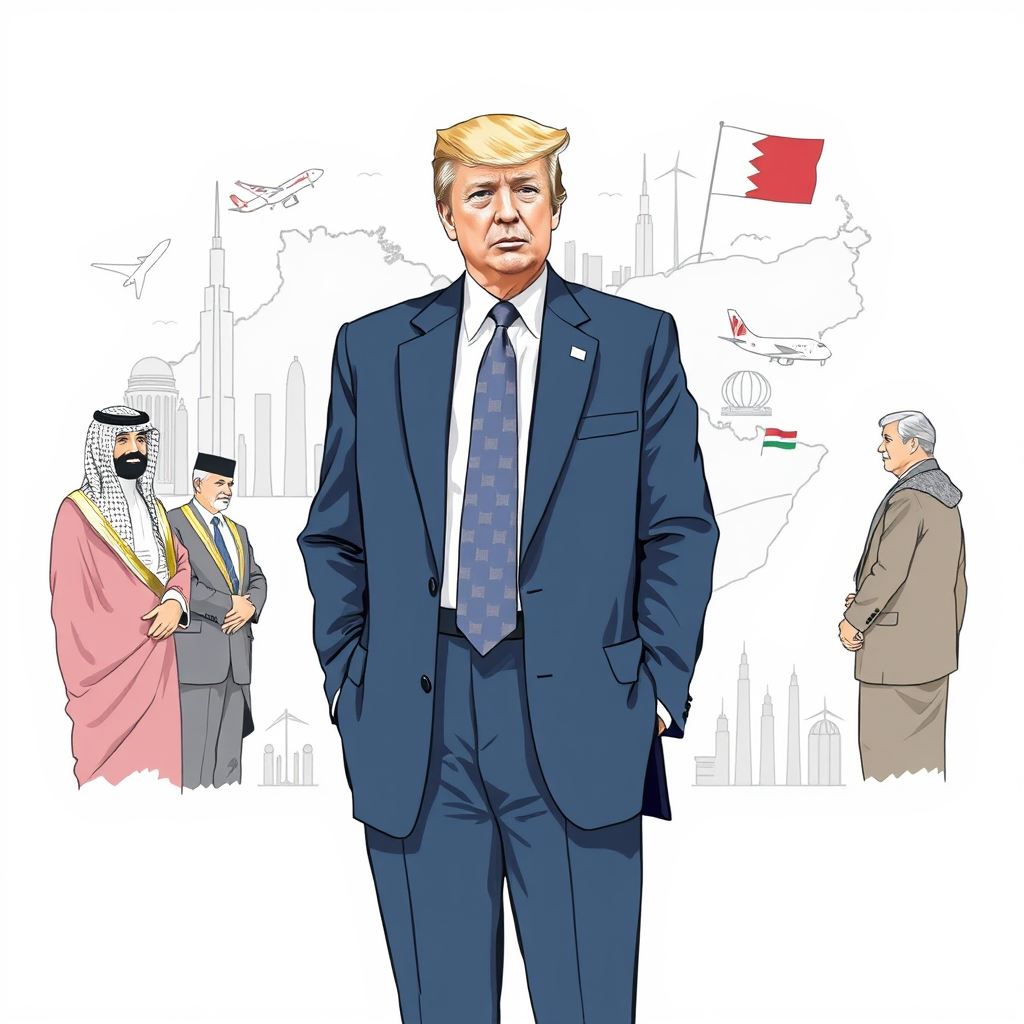Trump's Middle East Visit Ignites Business and Crisis Talks

On Monday, US President Donald Trump will embark on a trip to Saudi Arabia, Qatar, and the United Arab Emirates, seeking significant business deals amidst the complex geopolitical landscape of the Middle East. Despite the region’s ongoing tensions, including the conflict in Gaza and Iran’s nuclear ambitions, the White House has expressed Trump’s enthusiasm for a ‘historic return’ to the region.
Eight years prior, Trump’s inaugural overseas trip as president also began in Riyadh, where he famously posed with the leaders of Egypt and Saudi Arabia over a glowing orb. This choice to prioritize the Gulf states over traditional Western allies highlights both their growing geopolitical influence and Trump’s personal business connections in the area.
Jon Alterman, director of the Middle East program at the Center for Strategic and International Studies, suggests that Trump’s affinity for the Gulf region stems from the warm reception and business opportunities he finds there. ‘His hosts will be generous and hospitable. They’ll be eager to make deals, flatter him, and treat his family as potential business partners,’ Alterman noted.
Trump’s visit to Riyadh, Doha, and Abu Dhabi is expected to be marked by grand ceremonies and substantial deals spanning defense, aviation, energy, and artificial intelligence. The president’s spokeswoman, Karoline Leavitt, stated that Trump aims to promote a vision where ’extremism is defeated in place of commerce and cultural exchanges.’ However, he will inevitably confront regional crises such as the war in Gaza, the Houthi rebellion in Yemen, and the turmoil in post-Assad Syria.
Under Trump’s second term, the Gulf states have played crucial diplomatic roles. Qatar has mediated between Hamas and Israel, while Saudi Arabia has facilitated talks on the war in Ukraine. Anna Jacobs, a non-resident fellow at the Arab Gulf States Institute in Washington, remarked, ‘Trump is coming to the Gulf first because this region has become a geopolitical and financial center of gravity.’
In Riyadh, Trump will meet with the leaders of the six Gulf Cooperation Council states: Saudi Arabia, the UAE, Bahrain, Qatar, Kuwait, and Oman. Notably absent from his itinerary is Israel, the United States’ closest ally in the region, sparking speculation about strained relations between Trump and Israeli Prime Minister Benjamin Netanyahu.
Israel has set Trump’s trip as the deadline for a ceasefire deal with Hamas before proceeding with its plan to ‘conquer’ Gaza and displace most Palestinians. Meanwhile, Trump has adopted a more hands-off approach, although the US claims to be working with Israel on a plan to deliver aid to the besieged enclave. Efforts to persuade Saudi Arabia to recognize Israel, a goal from Trump’s first term, are likely to remain on hold as Riyadh insists on seeing progress toward a Palestinian state.
Iran will also be a major topic of discussion. Washington and Tehran are set to hold the latest round of indirect talks on Iran’s nuclear program in Oman on Sunday. Additionally, Trump’s suggestion to rename the Persian Gulf as the Gulf of Arabia has drawn ire from Iran.
The White House has dismissed concerns about Trump’s personal business interests during the trip. Last month, the Trump Organization finalized a luxury real estate deal in Qatar and unveiled plans for a billion-dollar skyscraper in Dubai, with apartments available for purchase using cryptocurrency. Trump’s son Eric was promoting a crypto firm in Dubai, while Don Jr. was preparing to discuss ‘Monetizing MAGA’ in Doha. However, the White House maintains that Trump’s actions are solely in the interest of the United States.
In my opinion, Trump’s trip to the Middle East is a clear example of his administration’s priorities: business deals and personal relationships over diplomatic protocol. While the region is fraught with tension, Trump seems more interested in the pomp and ceremony, as well as the potential for profitable agreements, than in addressing the deep-seated conflicts. This approach may provide short-term gains, but it risks exacerbating long-term issues and straining relationships with traditional allies.